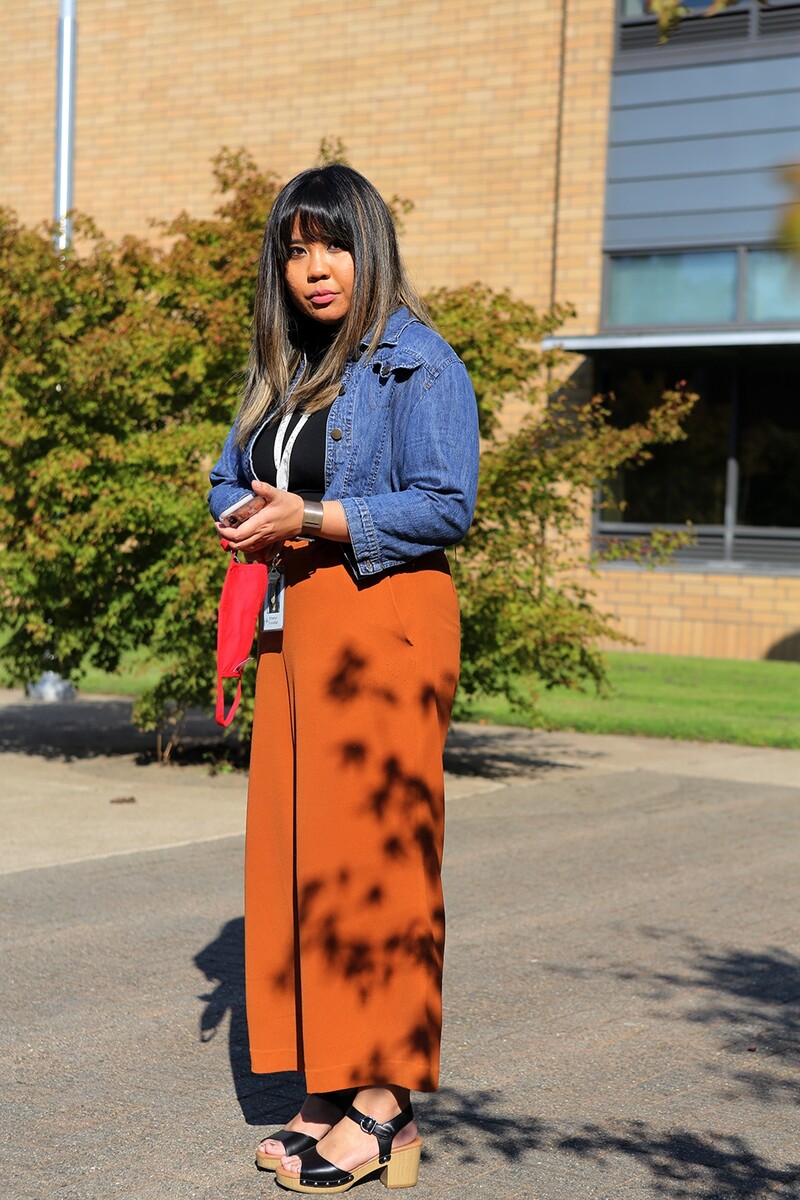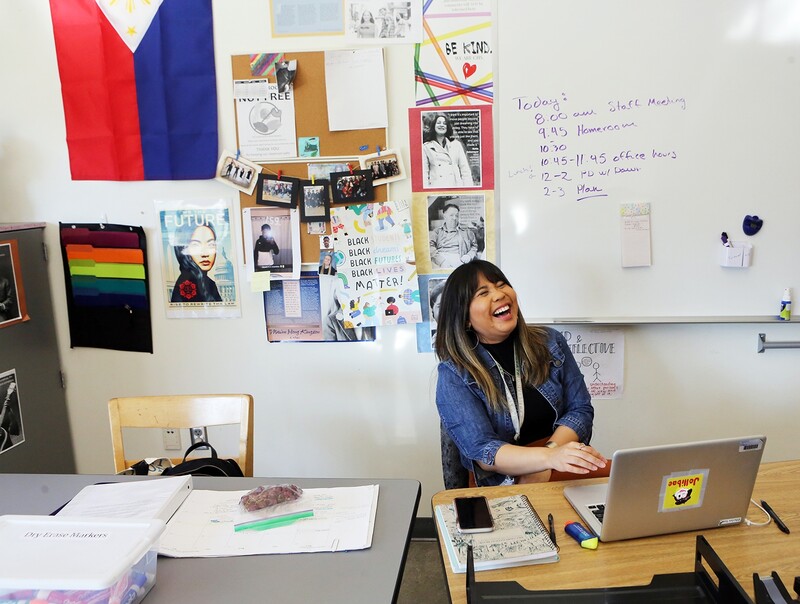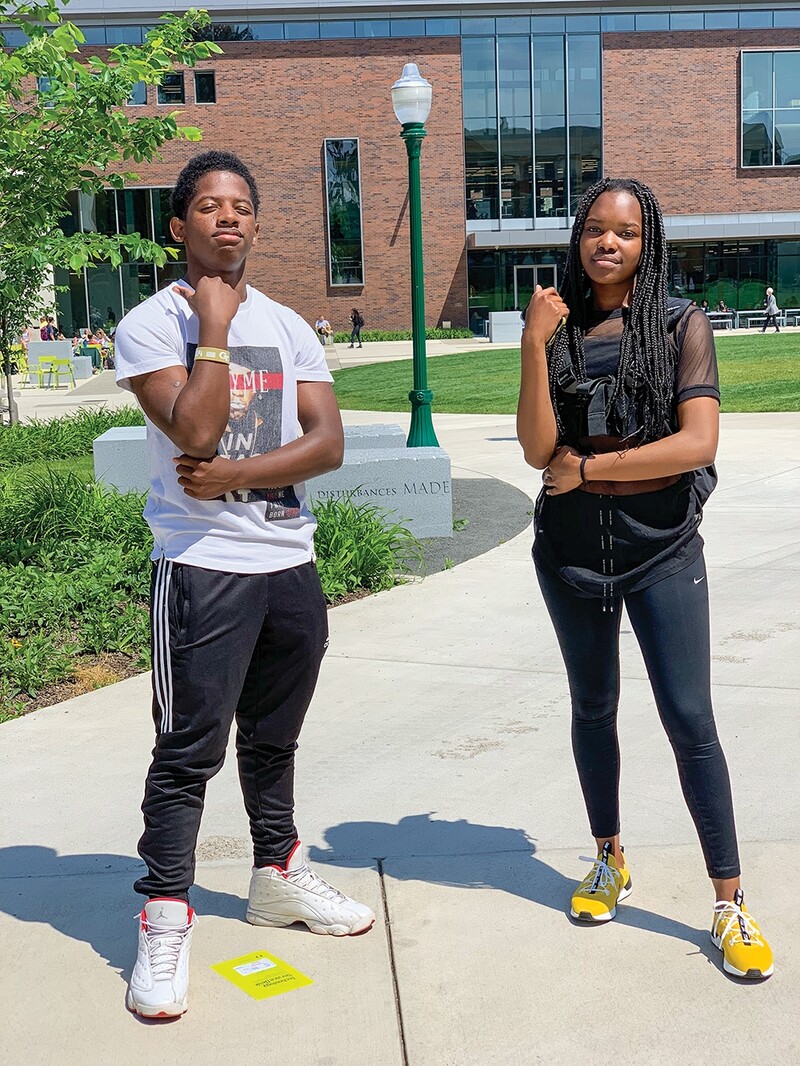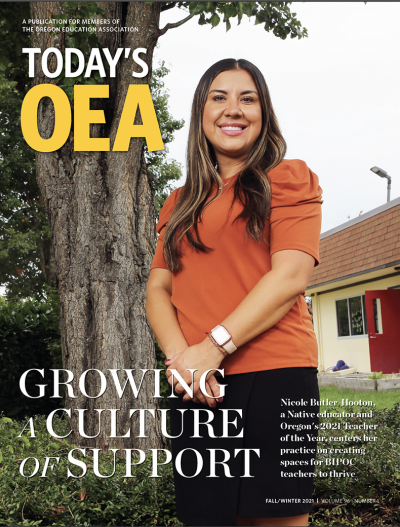Any teacher would be proud to see the sight I beheld on that sunny day in June of 2020: every Black student that had passed through my classroom doors for the past three years had one fist raised up in the air, chanting at the top of their lungs, “We gon’ be alright!,” “This is America!,” “No justice, no peace!,” and “Black Lives Matter!” As I walked with two other teachers beside me, the visual presence of all our students shook me to my core and overwhelmed me with pride.
I never thought I would see this scene play out in the sleepy suburb and predominantly white Happy Valley. The Happy Valley Youth Walk was a grassroots event that Clackamas High School alumni Monnie Spears-Rogers organized through social media and quickly grew to be a march of over a thousand people. One thousand community members walked three miles from Clackamas High School to City Hall. There were speakers of all ages, including North Clackamas School District’s own board member Libra Forde, asking the whole community to come together and acknowledge what all of the Black students have been asking at our schools for years: that Black Lives Matter.

First Year Teaching
I consider myself a very privileged early educator. Not only do I teach AVID, I also teach 10th and 11th grade English Language Arts. When I got hired at Clackamas High School, I was given two things that not many first year teachers are given: agency and support. I had full control of my curriculum as long as it hit ODE ELA standards, and I selected the pre-approved texts from the library collection. I work with an amazing English department, administration, instructional coach, and school community that openly says: “CHS values every student and every identity. As such, racist, sexist, homophobic, or otherwise offensive language/behavior is not tolerated here at Clackamas High School.” There was an equity committee that created whole-school lessons to improve school climate and culture. North Clackamas School District touts an equity lens, so it makes sense, right?
My first year of teaching was one of the hardest years of my life. Not just because of the challenges of being a first-year teacher (the onboarding, creating curriculum, finding your teaching community and mentors), but I explicitly created a decolonized curriculum. Boy, was I scared the first year I taught my curriculum. I purposefully centered either authors of color or issues of race. And this was not easy considering the canon that I had to choose from: we started with justice and law in To Kill a Mockingbird, then decolonization in Chinua Achebe’s Things Fall Apart, then a unit on bilingualism and the power of language, and we ended the school year with a unit I created called “From Harlem to Hip-Hop: Poetic Justice.” I dove headfirst into that pool of difficult conversations without even checking the temperature of the water. One of the toughest conversations that I had in class was with a White, male student whose father is a well-respected police officer. We were ending my unit reading To Kill a Mockingbird and he confronted me in front of the whole class.
“Ms Tumalad, do you not like the police?”
“What makes you say that?”
“Because, we are reading something with Black Lives Matter. Does that mean you hate police?”
“Absolutely not. I have many loved ones who serve. My brother-in-law is in law enforcement. My father served in the military for more than 20 years. I think that it’s not...so cut and dry. What we need to do is look at the world around us and be critical of the systems that we are in. I think that I can still love my brother-in-law and my father but be critical of systems...right?”
“Yeah...You’re right.”
His face was thoughtful and inquisitive...that light bulb had gone off. That ‘Ah-ha’ moment that teachers see when critical thinking happens. But I was still afraid to say it. It’s my first year teaching and was I really going to say those words in front of all my students? Black Lives Matter?
We end To Kill a Mockingbird with watching the Netflix documentary “13th” by Ava Duvernay and reading the introduction to Mychal Denzel Smith’s Invisible Man, Got the Whole World Watching: A Young Black Man’s Education. We read the introduction together slowly, a memoir about the author’s life and his lived experience the moment upon hearing about the death of Trayvon Martin. We dissect the piece and what it means. I ask the questions: What stories does the author talk about when it comes to White Supremacy? How does Trayvon Martin become a symbol? For what? What do Black boys ‘absorb’? What does the author mean by this? And most importantly, How does this essay connect with To Kill a Mockingbird? Each year the answers become more nuanced and sophomores dive deeper into systemic racism and White supremacy. And each year since that awkward conversation, students have craved to continue reading Denzel Smith’s memoir.
My journey as a non-Black person of color has been an interesting one, and one that I am open about with students. To lead students to talk about identity and race can be difficult when you have not done the work internally yourself. As a first generation, immigrant, non-Black POC who grew up in a small town that was 80 percent white, I did not have a Black educator until I reached college. It was not until I travelled back home to The Philippines as an adult did my identity solidify: I am an Asian Pacific Islander. I am Filipino, I am Brown, and I am Asian. And what does this mean as an educator?
My answer came in the form of community. Coming from a collectivist culture, I need community in order to survive. Unfortunately, as a first-year teacher, my school district did not have an official mentorship program. I sought mentorship out purposefully and one of the greatest assets my district has is an affinity group for educators of color. I met the Black leaders, mentors, and veterans from my district (shout out to Desi Nicodemus and Robert Blake) and other districts (you’re my girl, Katherine Watkins). There is power in being unapologetic and authentic outside of dominant White culture, especially with other educators of color.
My first year teaching as a non-Black educator of color came with many stumbling blocks. As the year passed, I learned how to navigate discussions about race more freely, I received support from the NCSD Educators of Color Affinity Group, and with the help of some brave students, started Clackamas High School’s first Asian Student Union. By contrast, I remember never saying the words Black Lives Matter. They fumbled in my mouth and instead I tried my hardest to act them, instead of saying them.

Fourth Year Teaching
Now I’m entering my fourth year — I still consider myself new but there’s a bit more strength in how I teach what’s deeply close to my heart. I am happy to report that each year, the conversations have gotten easier. My units have changed and fluctuated since my first year, and I am proudly an early career educator who is still learning.
I’ve learned that to be an educator who honors Black Lives is to be an anti-racist educator. I am not the perfect educator and I am still in the first years of teaching. But I know this: All lives will matter when Black Lives Matter. And in order for this to happen, we as educators must disrupt the Eurocentric, colonial, White supremacist systems and narratives that our students are taught. We have to look at our curriculum, our grading systems, our disciplinary actions. We have to believe that it’s a space where we can help students form acts of liberation and not a place they memorize random facts. We must believe that blackness isn’t a barrier. Believe that kids want to learn and be authentically themselves - whatever form they come in. Believe that in order to learn, students must first know they matter.
Last year, I had a conversation with a Black student that I will never forget. He sat there next to me while I was helping him with his project on community and Hansberry’s “Raisin in the Sun.” He looked around the classroom at his classmates and then said to me,
“Ms Tumalad, how does it feel to know that your classroom is one of the only places in the school that minority students are the majority...and they feel safe?”
I had to stop myself from telling him not to call himself a minority. Nothing about him and his peers are minor, nothing at all. Instead of ‘correcting’ him I smile and respond,
“It feels amazing. If I can give you one thing...at least it’s this space. In our school, in our district, in our country...it’s the least that I can give you.”
I saw this same exact Black student at the Happy Valley March this June, marching with all of his friends, his fist held up high. There’s a sense of urgency when you see your own students with their fists raised in the air walking side by side in confidence about social justice. The summer of Ahmaud Arbery, George Floyd, and Breonna Taylor was the summer I heard my Black students the loudest because I wanted to listen. I learned to hand the microphone over. That’s what you need to do as a non-Black educator: you must listen. I listened in June when my students turned in their final podcasts and they told stories of Ahmaud Arbery and Kendrick Johnson. I listened when these students gathered over the summer to create a coalition for all of the affinity groups in order to create change at Clackamas High School. I listened this September, when they started a Black Woman-Led Black Lives March. And I listened when, for their final AVID Senior project, these same students asked to lead a table talk on race.
This year I received a Black Lives Matter poster in the mail from my union, the Oregon Education Association. The first thing that I did was walk right into my empty classroom and put up the poster that OEA sent. The beautiful image and words are clearly visible behind me when I teach Synchronous Learning: Black Lives Matter.
Perspectives from our Students
What should Oregon schools be doing for Black students?
School is supposed to be a safe space where students feel welcomed and receive the utmost support from faculty members and their peers. With everything that is occurring in our world right now it's imperative to understand and hold the hands of all Black students. Like many other students of different races it’s already a challenge to navigate through our society. Just imagine how difficult it is for Black youth to maneuver through spaces that aren’t meant for them in the first place. Before anything teachers need to check their assumptions and bias. Instead of going straight to disciplining my Black friends, please try to understand our actions first instead of jumping to conclusions. Please ask yourself ‘why did I react this way?’ And we can work together to resolve the issues.
The first step schools in Oregon need to take, is teach real Black history. Although slavery and the Civil Rights Movement is a large part of American history, we are more than our struggles. I believe all schools should implement curriculums specifically for African studies making sure educators cover Black history across the diaspora. To realize Black history is not just about defeat, to decolonize Black history is to also teach about our heros, the Patrice Lumumbas, Wangari Maathais, and the Nelson Mandelas of Black history. Teach about the triumphs of Black people, to dissect ancestral cultures and traditions, and how we came to be.
-JEMIMA KONDE, 17

What do you wish to see your high school do for Black students?
In the wake of BLM becoming more mainstream, as well as anti-racism movements becoming more prevalent, you’d think that in school (being that it is a place where our minds are the most challenged) we’d be learning a more diverse curriculum. This moment in time is the perfect opportunity for the school to show up for us Black students. I can’t think of a time when pushing, learning, anything Black and being there for us Black students is more mainstream. Typically, our month is February and this is the perfect time to push a new curriculum and be more modern throughout the year. Sure we’ve all spent 12 years learning about Civil Rights and MLK and if your school was spicy enough perhaps Malcom X, but it's gotten old. One thing I’ve noticed about our history is that the man that controls the pen that writes always seems to white out his sins. This is all over our history curriculum. I’m calling for a change especially in terms of Black history. Sure it was interesting then and in elementary school but why don’t we learn about African history? We should learn more about world history, more than just wars. There should be a class for more than just learning about old White men. That’s basically every history class we have. We spend the years in school idolizing Whiteness. There’s Black kids growing up who learn about Whiteness and they end up hating themselves, and as a Black student at a PWI, I want my fellow students to know that there is more to my ethnic history aside from slavery and Civil Rights. I want there to be a more enriched and challenging story to tell about my people. I want my fellow scholars to know that we were people just like you or me before we were slaves, and that the story of Black people doesn’t begin with slavery.
One thing that Clackamas High School has done for me that has shown what their equity policy is supposed to stand for has been the Black Student Union chapter at the school. It has provided me with the safe space where my Blackness is not seen as a trend, weapon, or a disadvantage. It has truly allowed me to grow so much as a student, a person, and a young Black male in a state and community where people that look like me don't grow intellectually. However Clackamas High School although taking steps in the right direction, continually fails me and Black colleagues each and every year.
Another way Clackamas High school could support Black students is by pushing for more Black teachers. Imagine going to school for 12 years and having someone that doesn't look like you tell you the watered down version of your own history. It doesn't sound right, does it? That's because it's not. Now with more Black teachers in classrooms I know that personally I’d feel more comfortable and safe as I should at school. I’d feel as if the environment I’m in is one for learning and not for being an outcast. I know having more Black teachers for Black students would promote the overall tranquility and well being of Black students.
One more way Clackamas High School could help me and other Black students is allowing us to be ourselves. I feel like on more than one occasion I’ve been asked to do some things or not do some things so that another White student would feel more comfortable, and not to say school shouldn’t be comfortable for all, but who is to say that I shouldn’t be able to express myself through what I wear or rather what I say in terms of what's been culturally appropriate for me and other Black students. I feel like more often than not the comfort of White students is considered before the feelings of Black students are considered at Clackamas High School in racial incidents. This results in most racial incidents being brushed aside and now genuine anti racism efforts that were promised to me as a NCSD student are pursued.
In conclusion I’ve seen much and done much in my time as a student at Clackamas High School. I've seen admin brush racial incidents aside simply because a student might have a lot to lose, and I've also seen the admin take meaningful steps to try to adhere to their equity policy. Overall I feel like the pursuit of a safe and racism free learning environment has been placed in the hands of us, the Black students at CHS. I’ve been able to help pursue that dream with my work in BSU which I helped find about three years ago with some of the other Black students. Since its establishment I know that Clackamas has become safer for Black students, however overall I know there is still a lot of work to be done before the dream is achieved, and the equity promise for students of any color or ethnicity that we see so much of is actually achieved.
-XAVIER FEASTER-RIVERA, 17

